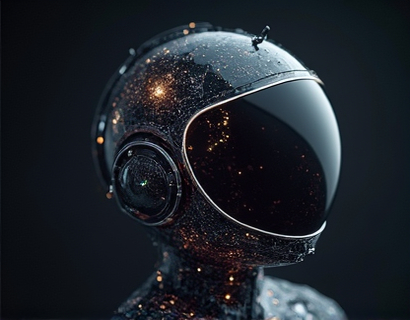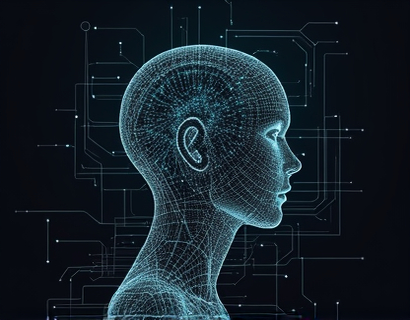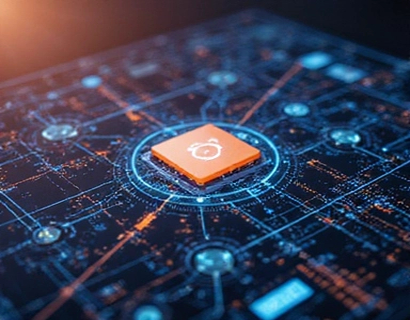Personalized AI Companions: Enhancing Creativity and Emotional Health in Children Through Interactive Digital Friends
In the rapidly evolving landscape of technology, personalized AI companions are emerging as a transformative force in childhood development. These digital entities, designed to interact with children in a personalized manner, offer a unique opportunity to boost creativity and emotional health. By engaging in interactive play within a safe and nurturing digital environment, children can experience profound benefits that extend beyond traditional forms of entertainment and education.
The concept of AI companions for children is not new, but recent advancements in artificial intelligence and machine learning have made these digital friends more sophisticated and tailored to individual needs. These AI systems use algorithms to understand and respond to a child's behavior, preferences, and emotional states, creating a dynamic and adaptive interaction experience. This personalization is key to fostering a deep and meaningful connection between the child and the AI companion, which in turn can significantly impact the child's cognitive and emotional development.
Fostering Creativity Through Interactive Play
One of the most significant advantages of personalized AI companions is their ability to stimulate creativity in children. Unlike passive forms of media, AI companions engage children in active play, encouraging them to think creatively and solve problems. For instance, an AI companion might present a child with a series of puzzles or storytelling scenarios, where the child must use their imagination to find solutions or continue the narrative. This process not only enhances cognitive skills but also nurtures a creative mindset that is essential for future success in various fields.
Moreover, AI companions can adapt the level of difficulty and complexity of tasks based on the child's progress, ensuring that the child is always challenged yet not overwhelmed. This balanced approach helps build confidence and resilience, as children learn to tackle increasingly complex challenges. The interactive nature of these digital friends means that children are not just consumers of content but active participants in the creative process, which is crucial for developing a strong sense of self and originality.
Supporting Emotional Growth and Well-Being
Emotional health is a critical aspect of childhood development, and personalized AI companions can play a vital role in this area. These digital entities are designed to recognize and respond to a child's emotions, providing support and guidance when needed. For example, if a child expresses feelings of sadness or frustration, the AI companion can offer comforting words, suggest relaxation techniques, or engage in activities that help the child process and manage their emotions. This empathetic interaction can be particularly beneficial for children who may struggle to express their feelings to adults or peers.
Additionally, AI companions can help children develop social skills by simulating conversations and role-playing scenarios. These interactions can improve communication abilities, empathy, and understanding of social cues. In a world where face-to-face interactions are sometimes limited, AI companions provide a valuable platform for children to practice and refine their social skills in a safe and controlled environment.
Creating a Safe Space for Exploration
The digital space provided by personalized AI companions is inherently safe, free from the risks associated with the physical world such as bullying, exposure to inappropriate content, or physical harm. This safety allows children to explore their thoughts and feelings without fear of judgment or consequence. The controlled environment ensures that interactions are positive and constructive, fostering a sense of security and trust.
Parents and guardians can also rest assured that their children are engaging with content that is age-appropriate and aligned with educational and developmental goals. The AI systems are programmed to monitor and guide interactions, ensuring that the experience remains beneficial and enriching. This level of oversight is crucial in today's digital age, where children's exposure to the internet and technology can sometimes be unpredictable and potentially harmful.
Enhancing Learning and Cognitive Development
Beyond creativity and emotional health, personalized AI companions can significantly enhance a child's learning and cognitive development. These digital friends can adapt to a child's learning style and pace, providing personalized educational content that caters to their unique needs. For instance, an AI companion might use interactive games to teach mathematical concepts, or engage in science experiments through virtual simulations. This tailored approach ensures that children are not only learning but also retaining and applying new knowledge effectively.
Furthermore, AI companions can track a child's progress over time, identifying areas of strength and areas that need improvement. This data can be valuable for parents and educators, providing insights into the child's developmental trajectory and helping to tailor educational strategies accordingly. The continuous feedback loop between the AI companion and the child creates a dynamic learning environment that is both responsive and effective.
Building Confidence and Self-Esteem
The positive interactions and achievements facilitated by personalized AI companions can have a profound impact on a child's self-esteem and confidence. As children successfully complete tasks and see their progress, they develop a sense of accomplishment and self-worth. The AI companion serves as a constant source of encouragement, celebrating small victories and providing constructive feedback that promotes growth rather than discouragement.
This supportive environment helps children overcome fears and doubts, fostering a resilient mindset that is essential for facing future challenges. By experiencing success and recognition in a digital setting, children can carry these positive feelings into their real-world interactions, leading to improved social and academic performance.
Encouraging Empathy and Moral Development
Personalized AI companions can also play a role in developing a child's empathy and moral compass. Through storytelling and role-playing scenarios, these digital friends can present situations that require ethical decision-making and understanding of others' perspectives. For example, an AI companion might create a scenario where a character faces a moral dilemma, prompting the child to consider different actions and their consequences. This process helps children develop a nuanced understanding of right and wrong, as well as the ability to empathize with others.
Moreover, AI companions can simulate interactions with diverse characters, exposing children to different cultures, backgrounds, and experiences. This exposure can foster a sense of inclusivity and respect for diversity, which is increasingly important in our globalized world. By engaging with a variety of perspectives through their AI companions, children can grow into more empathetic and socially aware individuals.
Conclusion
The integration of personalized AI companions into childhood development offers a promising future for enhancing creativity, emotional health, and overall well-being. These digital friends provide a unique and safe space for children to explore, learn, and grow, supported by advanced technology that adapts to their individual needs. As the field continues to evolve, the potential benefits of AI companions in childhood development are likely to expand, offering new opportunities for parents, educators, and children alike.
While the technology is still in its early stages, the positive outcomes observed thus far are encouraging. By embracing personalized AI companions, we can create a more nurturing and stimulating environment for children, helping them to thrive in both their personal and academic lives. The future of childhood development is bright, with AI companions playing a pivotal role in shaping the next generation of creative, emotionally intelligent, and confident individuals.











































